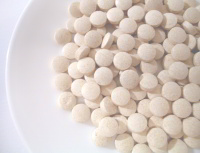Medication-Overuse Headache and the Brain (new study)
It has been estimated that half of the patients with chronic headache types have medication-overuse headache. If you’re taking abortive medication for more than 10 days each month, you may have medication-overuse headache (commonly called rebound headache).
 |
MOH could be a result of abortive medications such as triptans, paracetamol / acetaminophen, ibuprofen, and many others. The good news is that most patients seem to improve once they stop taking the medication. They also tend to respond better to preventative medications.
The bad news is that some patients do not improve – a significant number. Has the medication overuse done permanent damage to the brain?
A study in Switzerland, published last month, investigated grey matter changes in the brain to see if there was a difference among patients who did improve and who didn’t.
Changes in grey matter related to chronic pain are well known. But could these changes predict how well a patient will respond to treatment?
These researchers believe so. The evidence demonstrated that there were indeed differences between patients who improved and patients who did not. A lot of the difference could be seen in the orbitofrontal cortex area of the brain.
The orbitofrontal cortex is one of the least-understood areas of the brain, but it does seem to relate to decision-making, mood, and social interactions.
This study is another reminder of how important it is to get proper ongoing treatment. It also shows again that every patient is different. It may give us clues about how well certain patients will respond to certain treatments, and how headache conditions and other chronic pain conditions impact the brain physically.
References:
- The study: Decrease of Gray Matter Volume in the Midbrain is Associated with Treatment Response in Medication-Overuse Headache: Possible Influence of Orbitofrontal Cortex.
- The International Classification of Headache Disorders, 3rd edition (beta version)
- The Mysterious Orbitofrontal Cortex.
- Neuroscientific Foundations of Anesthesiology

23 October 2013 @ 2:37 pm
Great! Something else to worry about!
23 October 2013 @ 2:50 pm
Its always something!
23 October 2013 @ 3:05 pm
Thank you : ))
23 October 2013 @ 3:08 pm
I have come across a couple of articles over the last few months that suggested the rebound pain theory is just a theory and may not be accurate. Another theory is that some people may have problems with rebound pain while others do not (differing bepiochemistries). Below is a link to an article about one neuro who is having positive results treating chronic migraneurs with daily triptan use. I know I don’t have rebound pain… I can need a lot of Imitrex for days in a row, sometimes weeks, but then suddenly the migraines let up (often when the weather changes), and I can go as long as a week (sometimes longer) and not have a migraine. And… although I have daily pain in my spine and joints (due to a lot of degenerative changes that started quite early and some old injuries, too), my pain is so much worse when the barometric pressure drops (or changes quickly either direction). Otherwise, I can manage the pain relatively well with low dose meds without needing more or needing to raise the dosage. We really need more studies! 🙂 http://www.nyheadache.com/blog/daily-use-of-triptans/
23 October 2013 @ 3:09 pm
* um.. biochemistries, not bepo… LOL
23 October 2013 @ 3:18 pm
I def believe in rebounds I know for myself anyways my body gives me hell like a craving and want and then I take a pill, or a shot (maxalt or imitrex shot) and it sometimes subsides some of the pain. Sometimes I just have to go through the hell and agony cause I know if I don’t my monthly meds will disappear too soon and then I’ll be screwed for the remainder of the month.
23 October 2013 @ 3:20 pm
I can vouch for this one!!! I was taking 15 Imitrex per month & my doctor called me in to say my drug benefit company had called. They pointed out that people taking that many have serious side effects… including blindness. I found an alternative & no longer get migraines.
23 October 2013 @ 7:06 pm
I never believed in rebound headaches. After 35 years of migraines which had become daily, I was taking 6 Vicodin a day and 8 Zomig. I had surgery on my forehead by Dr Bardia Amirlak in Dallas and he found 2 sets of extra nerves and extensive scar tissue compressing the facial nerves. A week after the surgery and I’m taking minimal medication, mostly for the swelling and pain from surgery. Find the cause and the migraines will go away.
MigraineMisfits
24 October 2013 @ 5:00 am
MOH…so why is it that some people improve after stopping medication, and some don’t?? Hmmmmm…
~Gina… http://t.co/ay68bRbQdQ
24 October 2013 @ 5:12 am
yOUR SUGGESTIONS ARE GOOD….
29 October 2013 @ 6:18 pm
I definitely suffer from MOH from excedrin use fir over 20 years and have tried to stop with no success. I fear I’m one of those with grey matter on the brain. If that’s the case I’m wondering is there anything that will help? This article really made me feel there is no help for me.